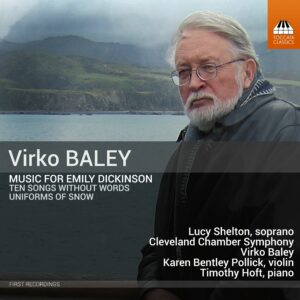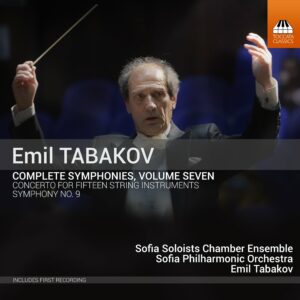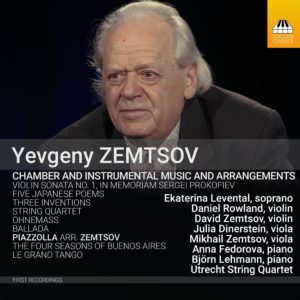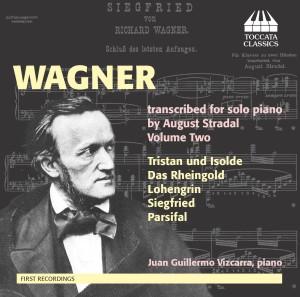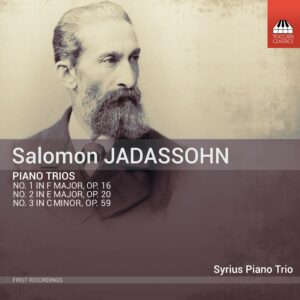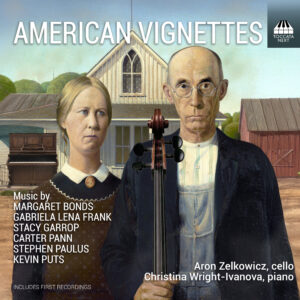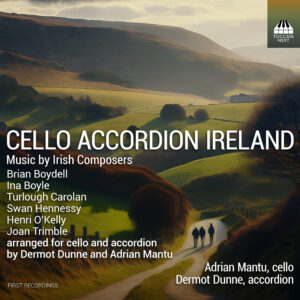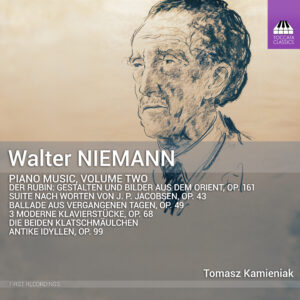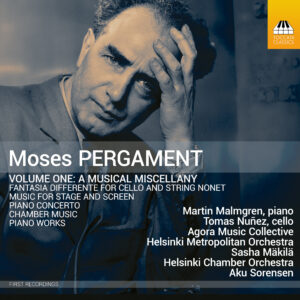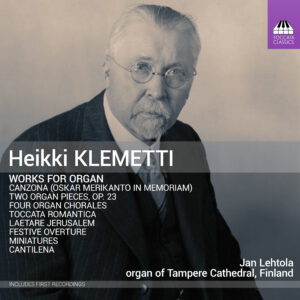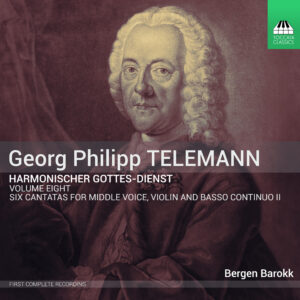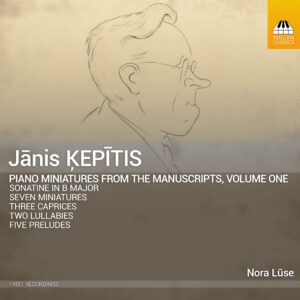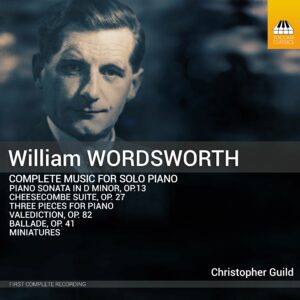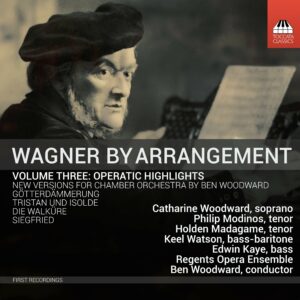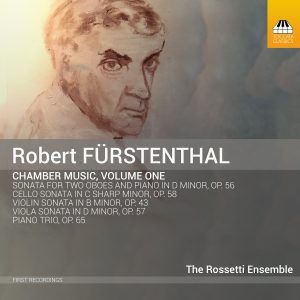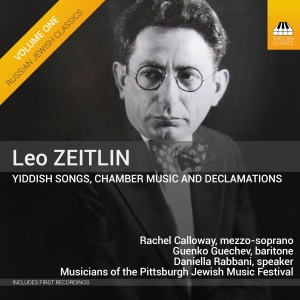Search Results for "The Black Alley Newty Ping" – Page 10
Showing results for black alley net ping
Virko Baley: Music for Emily Dickinson
Winner of the 2024 American Prize Ernst Bacon Memorial Award for the Performance of American Music, 2024
Virko Baley was born in Ukraine in 1938 and came to the USA as a refugee in 1949, eventually making his home in Las Vegas. He has long been fascinated by the poetry of Emily Dickinson, as can be heard in the two moving works recorded here – one an orchestral song-cycle setting her texts, the other a suite for violin and piano inspired by those settings. They display an acute ear for orchestral colour, a fondness for dramatic gesture and a strong sense of lyricism, occasionally inflected by distant echoes of Baley’s eastern European origins, the richness of the song-cycle placing him downstream from Mahler and Berg and the restraint of the Songs without Words occasionally evoking Arvo Pärt.
Lucy Shelton, soprano
Cleveland Chamber Symphony
Virko Baley, conductor
Karen Bentley Pollick, violin
Timothy Hoft, piano
Emil Tabakov: Complete Symphonies, Volume Seven
The music of the Bulgarian composer-conductor Emil Tabakov (b. 1947) explores the darker side of the human spirit in monumental scores as austere as they are powerful. Like many of his earlier symphonies, the Ninth, nearly an hour in length, is conceived on a massive scale. The opening Adagio forms an epic, glacial prelude to the driving Presto second movement. Two further slow movements follow: a Largo, which offers an island of relief after the tumult of the scherzo, and a finale which, after opening with an extensive Largo of its own, is transformed into a wild, driving, violent Allegro moderato. The symphony is prefaced by a virtuoso study for string ensemble written over 30 years earlier and remarkable for its contrapuntal fireworks and its explosive, almost elemental energy.
Sofia Soloists Chamber Ensemble (Tracks 1–3)
Sofia Philharmonic Orchestra (Tracks 4–7)
Emil Tabakov, conductor
Yevgeny Zemtsov: Chamber and Instrumental Music and Arrangements
The Russian composer Yevgeny Zemtsov (1940–2016) may be as well known for the dynasty of musicians – most of them violists – that he fathered than he is for his own music. This first album ever to be devoted to his compositions features works from the beginning and end of his career: a with some early violin works, influenced by Tchaikovsky and Prokofiev, a Bartókian string quartet, three spirited and spiky piano miniatures, an oblique piano elegy and five late, enigmatic, almost ritualistic settings of Japanese haikus. Late in life, too, he discovered a fascination with tango, and the album also features his elegant arrangements for string quartet of two Piazzolla favourites.
David Rowland (violin) – Track 4
David Zemtsov (violin) – Track 5
Anna Fedorova (piano) – Tracks 4,8,11
Björn Lehmann (piano) – Track 5
Ekaterina Levental (soprano) – Track 12
Julia Dinerstein (viola) – Track 21
Utrecht String Quartet
Eeva Koskinen (violin)
Katherine Routley (violin)
Mikhail Zemtsov (viola)
Sebastian Koloski (cello)
Wagner: Transcriptions for solo piano by August Stradal, Volume Two
The Czech-born pianist and writer August Stradal (1860-1930) — a student of Bruckner and disciple of Liszt — was one of the more prolific transcribers of the nineteenth and earlier twentieth centuries, producing a vast quantity of piano music, including Liszt's orchestral works, most of the Bruckner symphonies, a good deal of the Baroque (not least a huge amount of Bach) and much more, most of it phenomenally difficult to play. This series of recordings presents his Wagner transcriptions, cast in the best barnstorming virtuoso tradition.
Juan Guillermo Vizcarra, piano
Salomon Jadassohn: Piano Trios Nos. 1-3
Salomon Jadassohn (1831-1902) is best remembered as a much-revered teacher at the Leipzig Conservatoire: his students included Busoni, Delius and Grieg; he himself studied with Liszt. Jadassohn's own compositions, roundly forgotten for a hundred years, are only now beginning to attract attention. As these three trios demonstrate, they are central to the German Romantic tradition, with something of Schumann's melodic inspiration, the spontaneity of Schubert and Mendelssohn's classicising elegance — fused together with Jadassohn's own impeccable craftsmanship.
Syrius Trio, piano trio
Elizabeth Cooney, violin
Jane Cords-O’Hara, cello
Bobby Chen, piano
American Vignettes: Contemporary Works for Cello and Piano
Though quintessentially American in spirit, the musical snapshots in this album are as diverse as the men and women who composed them. Drawing from influences as disparate as the blues, jazz, Broadway, gospel, folksong and the wild west, these ‘American vignettes’ merge popular idioms into a new canon of the repertoire for cello and piano. The distinctive voices of six US composers, from the late twentieth and early 21st centuries, here come together to weave a virtuosic and colourful tapestry of Americana.
Aron Zelkowicz, cello
Christina Wright-Ivanova, piano
Cello Accordion Ireland
The sound of the accordion is an underexploited resource in classical music; it is heard even less frequently in combination with other instruments. This recital of music by Irish composers for cello and accordion – from the nimble folk idiom of Turlough Carolan to the passionate Romanticism of more recent men and women – demonstrates just how effectively these colours blend together. And it is not just the medium which is unusual: much of this music is as good as unknown.
Adrian Mantu, cello
Dermot Dunne, accordion
Walter Niemann: Piano Music, Volume Two
The largest part of the output of the Hamburg-born composer and writer Walter Niemann (1876–1973), a student of both Humperdinck and Reinecke, is piano music: an astonishing 1,000 or so pieces, divided into 189 opus numbers. Most of them are lyrical miniatures in a warm and approachable late-Romantic style, some evoking the music of the past – often with a touching degree of dignity and restraint, but also with an occasional flash of good humour.
Tomasz Kamieniak, piano
Moses Pergament Volume One: A Musical Miscellany
The neglect of Moses Pergament (1893–1977) can be ascribed in part to the complexities of his life: he was born in Finland of Lithuanian-Jewish stock, a student in Russia and a Swedish citizen by 1919. As a result, no national culture stepped forward to claim him, with his outsider status initially worsened by blatant anti-Semitism – and the gradual realisation that he was one of the most interesting Swedish composers of the mid-twentieth century then fell away again after his death. This series of recordings aim to return his music to the public ear, beginning with an album tracing the growth of his style, from early Romanticism to a spicy Bartókian vivacity, occasionally animated by Jewish melos and dance-rhythms.
Martin Malmgren, piano
Tomas Nuñez, cello
Helsinki Metropolitan Orchestra
Sasha Mäkilä, conductor
Helsinki Chamber Orchestra
Aku Sorensen, conductor
Heikki Klemetti: Organ Music
Heikki Klemetti (1876–1953) was one of the most important figures in the Finnish music of his day: author, organiser, musicologist, editor, educator, folksong collector and, above all, choral composer. His work as an organist and composer for the organ has largely been forgotten, an omission this first-ever album of his organ music seeks to correct. The influence of Ostrobothnian folksong can readily be heard, and there are obvious points of contact with the musical language of Sibelius, not least in the unemphatic dignity and nobility of the style, with the modal harmonies occasionally calling to mind another of Klemetti’s contemporaries: Vaughan Williams.
Jan Lehtola, organ of Tampere Cathedral, Finland
Telemann: Harmonischer Gottes-Dienst, Volume 8
This is the eighth album in the first complete recording of the 72 cantatas in Georg Philipp Telemann’s collection Harmonischer Gottes-Dienst, published in Hamburg in 1726 – the first complete set of cantatas for the liturgical year to appear in print. The cantatas are designated for voice, an obbligato instrument (recorder, transverse flute, oboe or violin) and basso continuo, and generally take the form of two da capo arias with an intervening recitative. Although intended for worship, both public and private, Telemann’s cantatas are a masterly blend of tunefulness with skilled counterpoint and vocal and instrumental virtuosity.
Bergen Barokk
Jānis Ķepītis: Complete Music for Solo Piano, Volume One
The Latvian composer Jānis Ķepītis (1908–89) has a fairly low profile even in his home country, never mind beyond its borders. His output was nonetheless substantial, with no fewer than six symphonies to his name, ten concertos, a number of large-scale choral-orchestral pieces, countless songs and choruses and a voluminous body of chamber music – almost all of it unknown. Ķepītis was himself a gifted pianist, and his hundred or so compositions for piano show a predilection for the miniature. The works here, discovered among his manuscripts, inhabit a world downstream from Skryabin and Rachmaninov, with a gentle hint of Debussy and an occasional wisp of Latvian folk-music.
Nora Lūse, piano
William Wordsworth: Complete Music for Solo Piano
The reputation of the Anglo-Scottish composer William Wordsworth (1908–88), great-great-grandnephew of the poet, has recently been restored by a series of Toccata Classics albums of his orchestral music. His piano music, too, was poorly known before now, none of it recorded since a handful of pieces appeared on LP 60 years ago – though his epic Piano Sonata is a work of major importance. This first ever complete recording reveals an honest, unfussy approach to the keyboard akin to that of two other major symphonists, Sibelius and Rubbra: like them, Wordsworth’s primary concern seems to have been the expression of deep feeling – which makes the gentle story-telling of his miniatures for children all the more surprising.
Christopher Guild, piano
Wagner by Arrangement: Volume Three, Operatic Highlights
Necessity being the mother of invention, the English conductor Ben Woodward has arranged the full-symphonic textures of some of Wagner’s operas for eighteen-part chamber orchestra to bring them within range of the forces available to Regents Opera in London – arrangements which should, indeed, put them with the reach of smaller companies everywhere. This new ‘room-sized Wagner’ enhances the sense of scale of the originals with a striking degree of clarity.
Catharine Woodward, soprano: Brünnhilde (Tracks 1,3,4), Isolde (Track 5)
Keel Watson, bass-baritone: Wotan (Track 1)
Philip Modinos, tenor: Siegfried (Tracks 2,3)
Holden Madagame, tenor: Mime (Track 2)
Edwin Kaye, bass: Hagen (Track 4)
Regents Opera Ensemble
Ben Woodward, conductor
Robert Fürstenthal: Chamber Music, Volume One
When Germany invaded Austria in 1938, Robert Fürstenthal, born in 1920, took the path of many Viennese Jews and fled to the United States, where he made his living as an accountant; the fact that he had written music in his youth was soon forgotten. Reconnection, after 35 years, with the woman who had been his first love rekindled both that flame and his urge to compose, and from then on songs and chamber music flowed from his pen, preserving the spirit of fin-de-siècle Vienna under the Californian sun – ‘When I compose, I am back in Vienna’, he explained. He died in November 2016, aged 96, knowing that his lyrical, eloquent music was at last attracting the attention of both musicians and microphones.
The Rossetti Ensemble
Malcolm Messiter (oboe)
Christopher O’Neal (oboe)
Sara Trickey (violin)
Sarah-Jane Bradley (viola)
Timothy Lowe (cello)
John Lenehan (piano)
Leo Zeitlin: Yiddish Songs, Chamber Music and Declamations
A member of the Society for Jewish Folk Music in St Petersburg, Leo Zeitlin (1884–1930) was known mainly for Eli Zion, a classic of Jewish art-music. Zeitlin died only seven years after emigrating to New York, still a young man, and his reputation languished until the recent discovery of a trunk full of scores brought his music back to light. This album attempts to remedy decades of neglect, especially for his charismatic Yiddish song-settings for voice, strings and piano. Zeitlin’s powerful declamations – Romantic piano music underscoring spoken Yiddish and Russian poetry – points to a genre that once was popular and is now forgotten.
Musicians of the Pittsburgh Jewish Music Festival: Rachel Calloway, mezzo soprano; Guenko Guechev, baritone and speaker; Daniella Rabbani, speaker; Elisabeth Pridonoff, piano; Luz Manriquez, piano; Dennis O’Boyle, violin; Laura Motchalov, violin; Marylene Gingras-Roy, viola; Isaias Zelkowicz, viola; Aron Zelkowicz, cello
Stay In the Know
JOIN THE TOCCATA NEWSLETTER
"*" indicates required fields
By visiting our site, you agree to our privacy policy regarding cookies, tracking statistics, etc.
